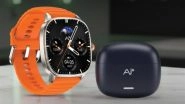In the dazzling world of K-pop, where idols are worshipped and every move is under the spotlight, there's a particularly chilling phenomenon: the infamous "Black Ocean." This term describes a sea of turned-off lightsticks, a stark and haunting visual cue of fan disapproval. Each K-pop fandom wields a distinctive lightstick to show support, but a Black Ocean emerges when fans shut theirs off, often due to intense rivalries and fan wars. For idols, facing a Black Ocean is a nerve-racking experience, a dramatic and public rejection that underscores the fierce stakes of fandom loyalty and competition in the K-pop realm. Vicky Kaushal’s ‘Tauba Tauba’ Gets Korean Twist! From BTS Jungkook to Jimin, Viral Fan Edits Dominate the Internet.
What Is the Black Ocean?
The black ocean occurs when the majority of a concert’s audience deliberately turns off their lightsticks during a group’s performance. Lightsticks are the primary way fans show support, so this act of switching them off is a clear and dramatic way to express discontent or disagreement with the group or their performance. The absence of those vibrant lights, which usually bathe the stage in a sea of colours, creates a stark and intimidating blackness that can be both a mental and emotional blow to idols.
Impact on the Korean Music Industry
The impact of the black ocean on the Korean music industry is profound. For idols, it’s not just about the immediate embarrassment or hurt feelings; it can significantly affect their morale and public image. Such an event can be damaging to a group's reputation, potentially affecting their future promotions and fan base. For the industry, it highlights the intense pressure and high stakes involved in maintaining fan support and navigating the often fickle nature of public opinion. BTS Jungkook X Vicky Kaushal: K-pop Golden Maknae Takes the Internet by Storm With Viral ‘Tauba Tauba’ Fan Edit – ARMY Can’t Keep Calm!.
Few groups faced Black Ocean indecent. Check it here:
Girls' Generation at the 2008 Dream Concert
"Fans aren't that toxic before"
Also fans during 2008 dream concert when Girls' Generation is still a rookie and performed in black ocean while SUJU and TVXQ's fans screaming Wonder Girls pic.twitter.com/0e2YJ78F0Q
— shun (@kibumkeyk_) December 26, 2020
Girls' Generation faced a black ocean at the 2008 Dream Concert, where fans turned off their lightsticks in protest. The group’s comeback was marked by perseverance and stellar performances, eventually leading to a resurgence in support and solidifying their status as K-pop icons.
Seventeen at the 2015 MAMA Awards
Seventeen encountered a black ocean during their performance at the 2015 MAMA Awards, reflecting dissatisfaction from some fans. The group responded by continuing to deliver high-energy performances and building a stronger connection with their fan base, which helped them regain their popularity.
BTS (2016)
bts received black ocean way back in 2013-2016, all fans turning off their lightstick in every awarding shows when it's bts time to perform but look at them now, owning the whole kpop awarding shows like their own concert. pic.twitter.com/GOIi9i15Sl
— divi (@tkluvus) June 11, 2020
BTS faced a black ocean during a performance in 2016, a stark contrast to their usual enthusiastic fan support. The group’s response involved showcasing their unwavering dedication through powerful performances and heartfelt connections, which helped them bounce back stronger than ever.
Twice at the Melon Music Awards (2016)
Twice encountered a black ocean at the 2016 Melon Music Awards, a rare setback for the popular group. They addressed the situation with exceptional performances and fan interactions, turning the tide and reinforcing their position as one of K-pop’s leading girl groups.
The Black Ocean's Legacy
While the black ocean remains a daunting part of the K-pop landscape, it also serves as a reminder of the dynamic and passionate nature of K-pop fandoms. For idols, it’s a challenge that demands resilience and an unwavering commitment to their craft. For fans, it’s a stark demonstration of the power they hold and the responsibility that comes with it. In the end, the black ocean is both a trial and a testament to the fervour and dedication that drive the world of K-pop.
(The above story first appeared on LatestLY on Jul 24, 2024 04:31 PM IST. For more news and updates on politics, world, sports, entertainment and lifestyle, log on to our website latestly.com).













 Quickly
Quickly


